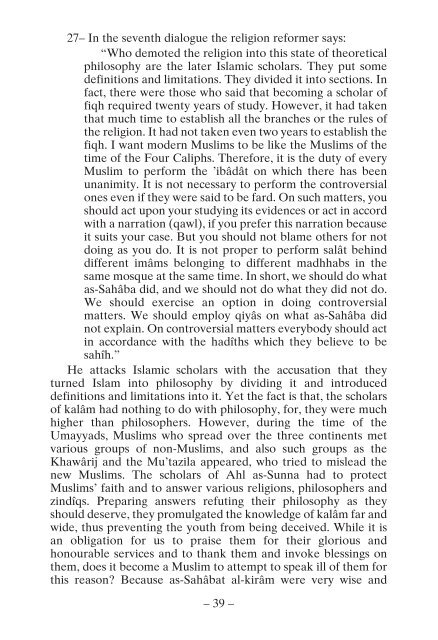Answer to an Enemy of Islam
Answer to an Enemy of Islam This is a refutation of the lies and slanders which the lâ-madhhabî Rashîd Rıdâ of Egypt, who appeared in the disguise of a religious man and wrote against the scholars of Islam in his book Muhâwarât.
Answer to an Enemy of Islam
This is a refutation of the lies and slanders which the lâ-madhhabî Rashîd Rıdâ of Egypt, who appeared in the disguise of a religious man and wrote against the scholars of Islam in his book Muhâwarât.
You also want an ePaper? Increase the reach of your titles
YUMPU automatically turns print PDFs into web optimized ePapers that Google loves.
27– In the seventh dialogue the religion reformer says:<br />
“Who demoted the religion in<strong>to</strong> this state <strong>of</strong> theoretical<br />
philosophy are the later <strong>Islam</strong>ic scholars. They put some<br />
definitions <strong>an</strong>d limitations. They divided it in<strong>to</strong> sections. In<br />
fact, there were those who said that becoming a scholar <strong>of</strong><br />
fiqh required twenty years <strong>of</strong> study. However, it had taken<br />
that much time <strong>to</strong> establish all the br<strong>an</strong>ches or the rules <strong>of</strong><br />
the religion. It had not taken even two years <strong>to</strong> establish the<br />
fiqh. I w<strong>an</strong>t modern Muslims <strong>to</strong> be like the Muslims <strong>of</strong> the<br />
time <strong>of</strong> the Four Caliphs. Therefore, it is the duty <strong>of</strong> every<br />
Muslim <strong>to</strong> perform the ’ibâdât on which there has been<br />
un<strong>an</strong>imity. It is not necessary <strong>to</strong> perform the controversial<br />
ones even if they were said <strong>to</strong> be fard. On such matters, you<br />
should act upon your studying its evidences or act in accord<br />
with a narration (qawl), if you prefer this narration because<br />
it suits your case. But you should not blame others for not<br />
doing as you do. It is not proper <strong>to</strong> perform salât behind<br />
different imâms belonging <strong>to</strong> different madhhabs in the<br />
same mosque at the same time. In short, we should do what<br />
as-Sahâba did, <strong>an</strong>d we should not do what they did not do.<br />
We should exercise <strong>an</strong> option in doing controversial<br />
matters. We should employ qiyâs on what as-Sahâba did<br />
not explain. On controversial matters everybody should act<br />
in accord<strong>an</strong>ce with the hadîths which they believe <strong>to</strong> be<br />
sahîh.”<br />
He attacks <strong>Islam</strong>ic scholars with the accusation that they<br />
turned <strong>Islam</strong> in<strong>to</strong> philosophy by dividing it <strong>an</strong>d introduced<br />
definitions <strong>an</strong>d limitations in<strong>to</strong> it. Yet the fact is that, the scholars<br />
<strong>of</strong> kalâm had nothing <strong>to</strong> do with philosophy, for, they were much<br />
higher th<strong>an</strong> philosophers. However, during the time <strong>of</strong> the<br />
Umayyads, Muslims who spread over the three continents met<br />
various groups <strong>of</strong> non-Muslims, <strong>an</strong>d also such groups as the<br />
Khawârij <strong>an</strong>d the Mu’tazila appeared, who tried <strong>to</strong> mislead the<br />
new Muslims. The scholars <strong>of</strong> Ahl as-Sunna had <strong>to</strong> protect<br />
Muslims’ faith <strong>an</strong>d <strong>to</strong> <strong>an</strong>swer various religions, philosophers <strong>an</strong>d<br />
zindîqs. Preparing <strong>an</strong>swers refuting their philosophy as they<br />
should deserve, they promulgated the knowledge <strong>of</strong> kalâm far <strong>an</strong>d<br />
wide, thus preventing the youth from being deceived. While it is<br />
<strong>an</strong> obligation for us <strong>to</strong> praise them for their glorious <strong>an</strong>d<br />
honourable services <strong>an</strong>d <strong>to</strong> th<strong>an</strong>k them <strong>an</strong>d invoke blessings on<br />
them, does it become a Muslim <strong>to</strong> attempt <strong>to</strong> speak ill <strong>of</strong> them for<br />
this reason? Because as-Sahâbat al-kirâm were very wise <strong>an</strong>d<br />
– 39 –

















